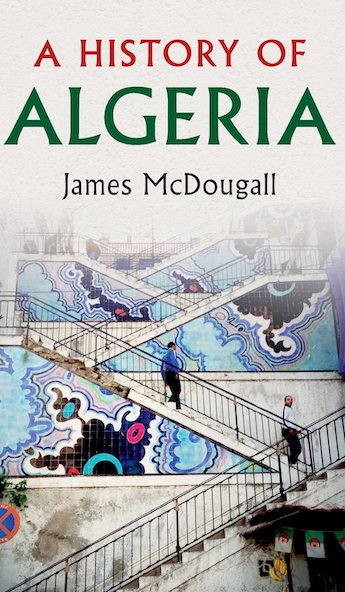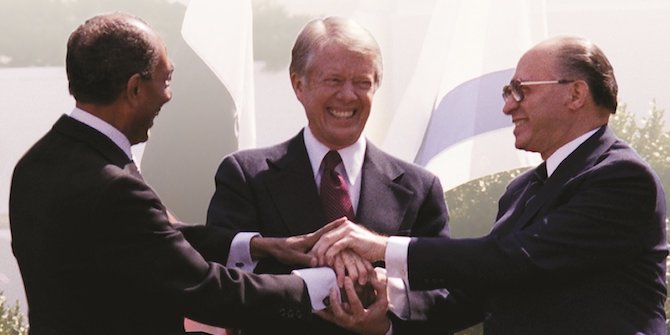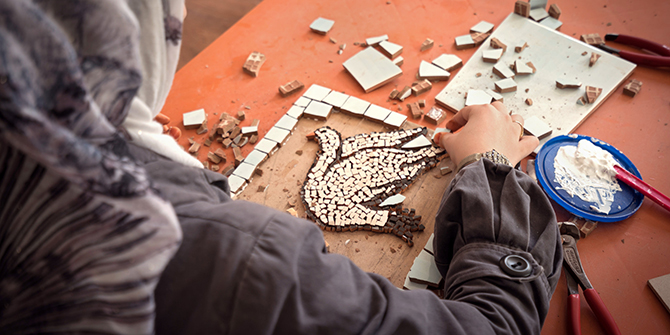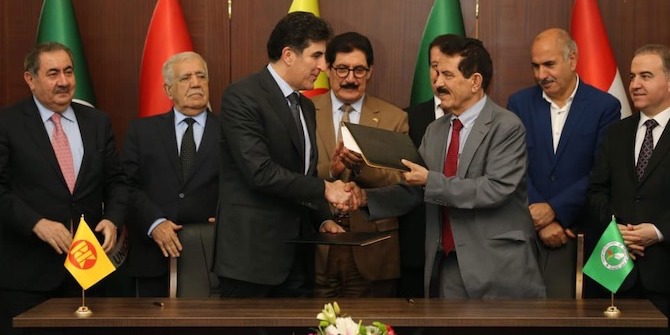by Benjamin P. Nickels
This landmark history of modern Algeria tells the story of an ‘extraordinarily robust, resilient society’ withstanding external and internal violence and repression through the past five centuries. James McDougall gives an accessible and general overview, but the book also showcases his particular talent for illuminating the life of Algerians under French rule, and has a nuanced and illuminating disquisition on Algerian nationalism.
James McDougall, associate professor of modern history at Trinity College, Oxford, has written a landmark work that sets a new standard for surveys of modern Algeria. He achieves his stated goal of presenting the country for its own sake, instead of instrumentalising Algeria as a case study or model in some other analysis or tale (p. 3). McDougall writes a 350-page story of national continuity, of Algeria’s ‘extraordinarily robust, resilient society’ (p. 4) withstanding ‘fierce’ state actions and weathering the country’s dramatic political ruptures.
In surveys, periodisation is a cornerstone of interpretation. McDougall divides Algeria’s immense past into seven chronological chapters. He begins (Chapter 1: the years 1516–1830) with the Ottoman capture of Algiers, only sketching as background Algeria’s earlier experience with classical antiquity, the advent of Islam, and so on. Despite the title, this is actually a history of modern Algeria. Starting with the Ottoman intervention also highlights a recurring dynamic that typifies modern Algerian history in McDougall’s view – namely, the ongoing tension between invasive state builders and community resistance from within. McDougall deals with the next round of this state-society dynamic, the French period, through separation. He dedicates one chapter to Algerians’ experience of conquest and resistance (Chapter 2: 1830–1911), another to their habituation to and dissent from colonial rule (Chapter 4: 1912–1942), but he inserts a full chapter in between (Chapter 3: 1830–1944) – the sole interruption in his book’s continuous timeline – to focus on French power and society in Algeria. This structural choice makes sense. The French impact is so formative that it must be addressed at length, yet Algeria’s history is too often conflated with French history in ways that obscure Algeria’s past. McDougall’s decision does mean, however, that he dedicates over a third of his work to just one long century (1830–1942) and over half the book’s pages to the colonial period, once his chapter on the Algerian Revolution (Chapter 5: 1942–1962) is taken into account. The years of French rule (1830–1962) thus become the de facto centrepiece of the book – and by extension, of Algeria’s modern history.
McDougall creates something of a new period – a sort of ‘Algerian 20th Century’ between 1912 and 2012 – with his final two chapters. Chapter 6 (1962–1992) covers three decades of limited growth and progress in the post-Independence Algerian republic, and Chapter 7 (1992–2012) looks at 20 years of violence and its impacts since the 1990s. Through periodisation, McDougall implies a parallel with Chapters 4 and 5 covering three decades of tension within Algerie francaise that yielded 20 years of violence and the Revolution. By this reading, twice across the last hundred years, Algeria’s unserviceable state has failed to meet Algeria’s political and economic needs, sparking prolonged and destructive conflicts within Algerian society. This notion of an ‘Algerian 20th Century’ elevates the 1990s in importance (through analogy with the War of Independence). It also sets a pessimistic tone regarding the likely future of Algeria’s state-society dynamic.
For a survey, A History of Algeria feels surprising personal. McDougall occasionally references his field notes (e.g., pp. 343, 362) and opens the book with a first-hand account of traveling along the Algerian coast in the mid-2000s (pp. 1–2). Interviews he conducted across 15 or so years prior to publication, including with a dozen prominent Algerians listed by name, many militants turned ministers, adds another personal touch (see pp. 394–5). McDougall’s love for primary sources also shows through. He cites papers from the files of Algerian and French archives, and he takes care in selecting pictures. He clearly dug around. Nearly half of the book’s 33 figures are rare finds from libraries and archives, private collections, or McDougall’s own photographs, and the images capture the humanity of both ordinary Algerians and their famous leaders.
A History of Algeria is a general overview, but it displays McDougall’s particular talent for illuminating the life of Algerians under French rule, and the book extends his abiding interest in Algerian nationalism. This work continues to add nuance and depth to Ferhat Abbas’ actions and writings (see e.g., pp. 156–9). Hopefully McDougall will one day write a full-length biography of this misconstrued nationalist figure, too often simplified as a Francophile moderate swept aside by radicals. The book also describes how Algeria’s security structures emerged during the French period, tracking their origins in the powerful counterespionage secret services built during the Revolution (e.g., pp. 210, 239, 256) and then profiling key people who took lead security roles in the 1990s (pp. 299–301). Providing both a new narrative of Algerian history and a judicious intervention in many historiographical debates, A History of Algeria, written by one of the leading historians of Algeria of our generation, is the most comprehensive, up-to-date, and valuable account of modern Algeria available.
 Ben Nickels is professor of international security studies at the George C. Marshall European Center for Security Studies in Germany, where he is course director of the Europe-Africa Security Seminar. Views expressed here are his own. He tweets at @BPNickels
Ben Nickels is professor of international security studies at the George C. Marshall European Center for Security Studies in Germany, where he is course director of the Europe-Africa Security Seminar. Views expressed here are his own. He tweets at @BPNickels







